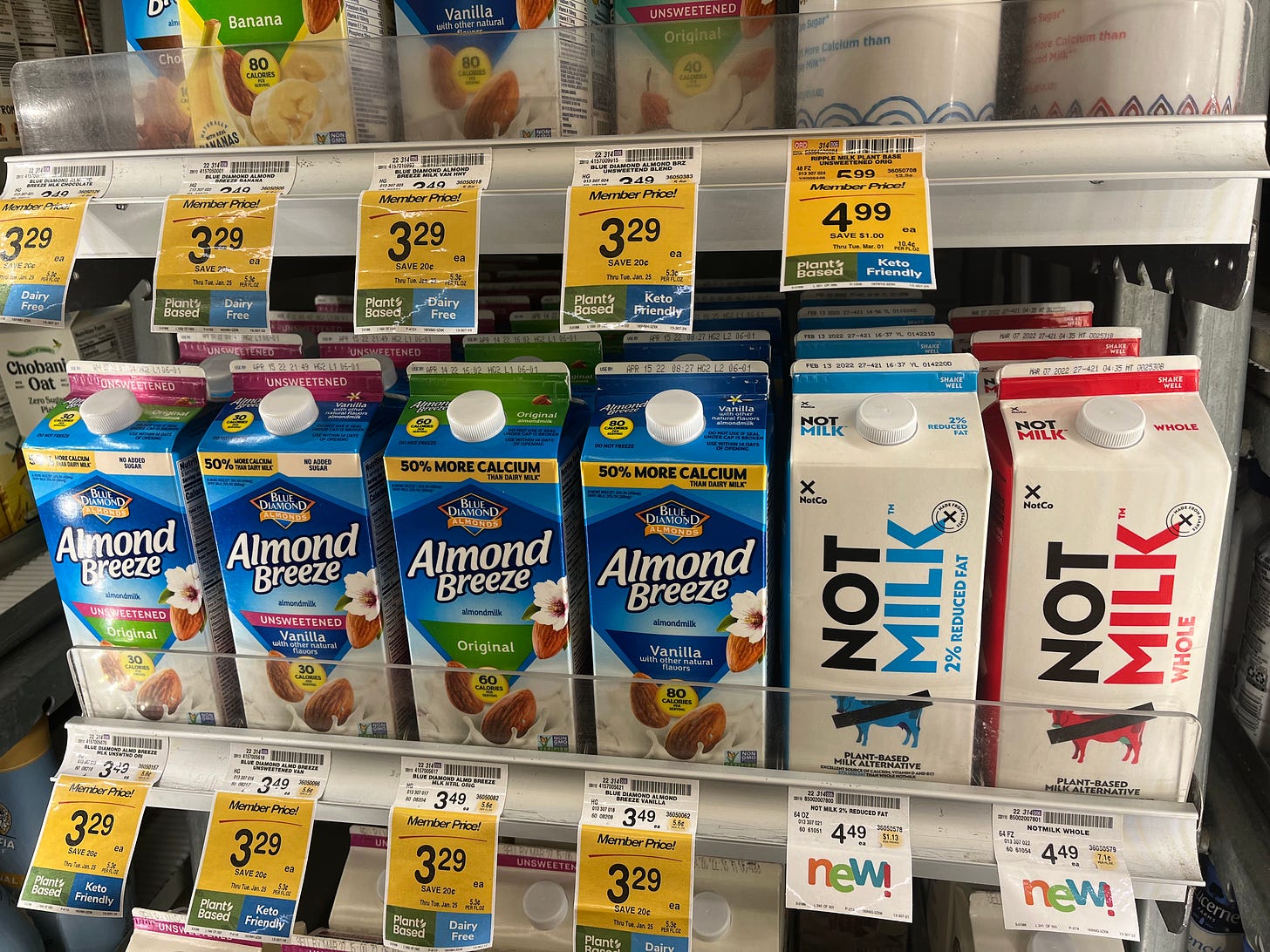Animal protein started it, will plant-based end it?
Prime Future 94: the newsletter for innovators in livestock, meat, and dairy
We recently bid adieu to plant-based meat mania with the (really) bearish case for the plant-based meat category:
(1) Timing - conditions over the last 24 months were all that plant-based meat companies could have hoped for, but it wasn’t enough.
(2) Competition is fierce and growing, which will continue pressuring (already negative) margins.
(3) Plant-based meat: it's still just a veggie burger.
But the canary in the coal mine is McDonalds, and the test they are running with the oh-so-cleverly named McPlant burger. For 3 reasons:
McDonalds menu board space is precious. Items have to earn their spot.
McDonalds menu board space is all the more precious now, since the menu has been pared down to simplify operations and decrease wait times amidst labor shortages.
Amidst a pared down menu board, sales have increased. Correlation or causation is hard to say, but it does seem reasonable to think that the hurdle to add something to the menu has been raised.
If McDonalds rolls out plant based burgers on a broad scale beyond the current trial, then my view might change.
And with perfect timing for this follow up, speculation about the McDonalds pilot results began popping up this week:
Beyond Meat’s high-profile collaboration with McDonald’s is not meeting expectations, with underwhelming sales of the plant-based McPlant burger triggering concerns from Wall Street analysts.
The downgrade came on the back of a tepid report on the McPlant’s rollout last week by analysts at another investment bank, BTIG, who described the burger’s sales performance as “underwhelming” after examining sales at 600 McDonald’s locations across the Bay Area and Dallas-Fort Worth region. According to BTIG, McDonald’s franchisees reported that “they don’t see enough evidence to support a national rollout [of the McPlant] in the near future”—with its lower sales volumes consequently “
slowing down service times, as the product was being cooked to order.”The analysts noted that while McDonald’s was expecting to sell 40 to 60 of the plant-based patties each day, its locations in the Bay Area and Dallas Fort-Worth were only selling 20 per day. Sales at rural East Texas franchises were even more anemic, numbering between three and five sandwiches per day. While remaining open to the product’s viability in “higher income, urban markets,” BTIG said “a wide-scale launch [of the McPlant] seems a ways off at this point.”
To put this in perspective, McDonald's sells an estimated 50,000,000 burgers every day in its ~38,000 stores across the world. Let's make the (incorrect) assumption that sales are equal across all stores, which would mean each store sells ~1,300 burgers per day.
So let’s say the McDonalds pilot stores sell ~1,300 burgers every day and have a target to sell 40-60 plant-based burgers.
And yet, those stores are only moving 20 plant-based burgers per day? (if the article above is accurate)
Yikes. I have a hard time believing the McPlant pilot doesn't go in the McTrash in the very near future.
Of course McDonalds is not the only path to foodservice growth, so perhaps plant-based companies will find growth in more regional or local chains? Maybe…or maybe McDonalds results really are the canary in the coal mine and the foodservice channel sales growth curve will begin to look eerily similar to the disappointing retail growth curve for plant-based meat: down and to the right.
In my last article, I readily admitted that I’m a skeptic but want to hear more of the bullish case for plant-based meat and why we bears might have it all wrong. What did they have to say?
One of the plant-based bulls responded to my last article on the topic with an astute analysis:
"Plant-based milk is today 15% of total dollar sales of retail milk (source: SPINS/GFI). That tells me that 15% of consumers are willing to go for a plant-based product if it meets their expectations in terms of taste, price, and convenience.
Plant-based meat is just 1.4% of total retail sales (same source). But if these products keep improving -- which they are -- then they could likely grow to at least 15% of the total market."
I appreciate this analysis because realistically milk is the best indicator of how plant-based could perform in meat.
But the unknown is IF plant-based meat can meet consumer expectation in terms of taste and price.
That same source referenced above, SPINS, recently said “the U.S. retail plant-based food industry grew 6% in 2021 to $7.4 billion, a slower pace than the year before. In 2020, total U.S. retail plant-based food sales grew 27%, to $7 billion.”
From 27% growth in 2020 to 6% growth in 2021 is not the trajectory you want to see if you are investing in a plant-based future.
SPINS also said, “New retail sales data …. shows that Plant-based meat sales remained steady in 2021, with $1.4 billion in sales. That compares to a growth rate of 45% in 2020.”
Plant-based meat went from a 45% growth rate in 2020 at retail to flat growth in 2021? 😵💫
Unless there is a really clear driver that explains those 2021 numbers, and why those numbers are an anomaly not a permanent downward trend, it’s unclear why they would magically bounce back up.
Other plant-based bulls site the need to feed the 9 billion people who will inhabit the planet by 2050, or the rising middle class looking to level up diets as incomes increase. For either of those arguments, cell-based or fermented meat technology seems like the more likely competitive threat to plant-fed meat, not plant-based. But more on that another day….including dissecting the 9 by 2050 holy grail itself. 🤭
Before we wrap up this plant-based discussion, let’s acknowledge how things have come full circle…
The animal protein industry has increasingly relied on absence marketing to differentiate meat, poultry & dairy products at retail. Consumers see labels like hormone-free chicken, antibiotic-free meat, rBST free milk. This approach is used so often, it almost feels like the only tool in the typical brand manager’s toolkit.
Only now, the toolkit has been hijacked:
This isn’t simply milk raised without xyz, it’s NOT MILK.
There's an irony in this, isn't there? Animal protein perfected the game of marketing on absence claims. Now the plant-based category is running the same playbook, and taking it to a whole new level.
NOT MILK - a brand 100% centered around what it is not - seems to be the extreme outcome, the height of decades of absence-based marketing.
On the optimistic hand, perhaps this extreme NOT MILK example means that the pendulum is about to swing back towards products that differentiate based on what they are, instead of what they are not.
I’m 100% here for that pendulum swing.
Bonus: a TikTok on how to make your own oat milk at home. Go nuts.






I would be curious to know a few things about the 15% of consumers who purchase plant-based milk:
1) What percentage are lactose intolerant and/or allergic to milk? I have a sister (and several Asian friends) who buy almond milk because they cannot handle even lactose-free milk...I am probably not far behind.
Note: I think a comparison of plant-based cheese sales vs plant-based milk sales would help answer this question.
2) What percentage of plant-based milk drinkers still eat meat?
Regarding animal protein cos relying on absence claims - the regenerative movement (and I'll emphasize - it's a movement) is where premium animal protein will have to go - and time will tell if the unregulated claim (not tied to Organic, which is regulated) will satisfy the conscious consumer: those limiting animal protein for environmental and animal welfare reasons.